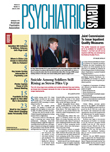Addiction psychiatry has made impressive progress since it became a recognized subspecialty in the early 1990s, but is facing significant challenges in continuing its growth to meet patient needs. At a recent summit during APA's 2008 annual meeting that was organized by APA and the American Academy of Addiction Psychiatry (AAAP), leaders in this subspecialty discussed the current state of training programs in the country and brainstormed ways to attract new blood.
Addiction psychiatry was formally recognized as a subspecialty by the American Board of Psychiatry and Neurology (ABPN) in 1993. By 2007, almost 2,000 psychiatrists had passed the ABPN examination for the Initial Certification in the Subspecialty of Addiction Psychiatry. Currently there are 39 active fellowship programs that specialize in addiction psychiatry nationwide, according to data presented by Marc Galanter, M.D., director of the Center for Medical Fellowships in Alcoholism and Drug Abuse at New York University School of Medicine. In the 2006-2007 cycle, 72 fellowship positions were available, of which 59 were filled. The number of programs has remained stable, at around 40, for the past several years.
One of the limitations to filling fellowship positions is funding. Galanter cited survey data showing that the mean salary of an addiction psychiatry fellow was $41,373 in 1992-1993, when the subspecialty was recognized by the ABPN, and $49,875 in 2006-2007. The government is the major funding source for most programs, especially those that are able to collaborate with the Department of Veterans Affairs (VA), several participants at the summit said. The VA has substantial needs for specialists in addiction psychiatry; this demand is growing as more veterans return from Iraq.
“APA shares the concerns of the addiction psychiatry leadership regarding recruitment of residents into subspecialty training,” James H. Scully Jr., M.D., medical director of APA, told Psychiatric News.“ Ensuring adequate funding for training programs is important as well as ending discrimination in insurance coverage for those suffering from addiction disorders. While the science has made great advances, stigma remains and affects funding for treatment and research in this area.”
Another concern noted at the summit is the perception held by many residents that the additional one or two years of training may not translate into economic compensation after they obtain the ABPN certification. In a survey of PGY-2 through PGY-4 residents and fellowship directors conducted by APA's Corresponding Committee on Training and Education in Addiction Psychiatry, residents believed that addiction psychiatrists are not well paid and have less job security than other subspecialty areas. For many, large medical student loans add to worries about career prospects.
The perception does not necessarily reflect reality, however. Fellowship directors at the summit commented that, based on their experience and the anecdotes of fellowship graduates, the demand for addiction psychiatrists is in fact high, and job vacancies for specialists are numerous.
John Renner, M.D., who served as the chair of the APA Corresponding Committee on Training and Education in Addiction Psychiatry from 2003 to 2008, told summit participants that residency rotations in addiction treatment, typically on alcohol or drug detoxification units, may leave many residents with the mistaken view that addiction psychiatry is not a rewarding career.
“A one-month experience in the inpatient detox unit often does not leave a positive impression on residents.” Residents, he said, tend to see a small group of returning patients on the detox units and infer that treatments do not work and that these patients are difficult. Longitudinal outpatient experience can provide a more positive and realistic picture of what addiction psychiatrists can achieve and demonstrate plenty of job satisfaction in practice, but such opportunities are not common in most residency curricula.
“It's important to keep in mind that the area of addiction psychiatry has seen a lot of growth in the past 15 to 20 years,” Eric Strain, M.D., chair of APA's Council on Addiction Psychiatry, told Psychiatric News in an interview. “The hope is that we can capture the interest of more residents to enter the field...to continue to make the specialty vibrant and grow.”
He continued, “One of the good ideas that came out of the summit was loan forgiveness for residents. The loans are clearly a significant burden for many residents and make it difficult for them to do a fellowship in a subspecialty.” The group will continue to advocate for loan forgiveness for addiction fellows. “This initiative could be win-win-win for residents, the subspecialty, and patients who need our service,” Strain commented.
Several participants at the meeting, including Renner, emphasized the need for more mentors and role models who can inspire residents to become interested in and choose to enter addiction psychiatry fellowships. The leaders at APA and AAAP will actively explore ways to provide more support to fellowship training directors and to help more medical students and residents learn about addiction psychiatry. ▪
